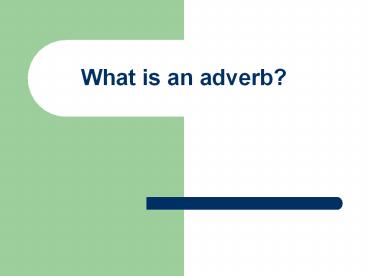What is an adverb? - PowerPoint PPT Presentation
1 / 11
Title:
What is an adverb?
Description:
What is an adverb? Adverbs Adverbs describe verbs, adjectives, or other adverbs. They answer the questions How Where When To what extent Adverbs in action The ... – PowerPoint PPT presentation
Number of Views:826
Avg rating:3.0/5.0
Title: What is an adverb?
1
What is an adverb?
2
Adverbs
- Adverbs describe verbs, adjectives, or other
adverbs. - They answer the questions
- How
- Where
- When
- To what extent
3
Adverbs in action
- The butterfly flew high. (describes a verb)
- Sue struggled with the extremely difficult math
problem. (describes an adjective) - Please look very carefully for errors. (describes
another adverb)
4
Double negatives
- In English only one negative is used at a time.
Since seldom, rarely, scarcely and hardly are
already negative adverbs, you do not add another
negative (no, not, none, no one, nobody, etc).
5
Good or Well?
- Good is an adjective and modifies or describes
nouns. Well is an adverb and modifies or
describes verbs. - Remember if you are using a linking verb or a
verb that has to do with the human senses (feel,
taste, sight, hearing, smell) you use the
adjective good. If you are using an action
verb (do, play, talk, run, dance, etc., use the
adverb well. - Generally, well describes health. It is
appropriate to say, I am good. Good is an
adjective describing I.
6
Adjective or Adverb
- Adjectives describe nouns and answer which one,
what kind, or how many - Adverbs describe verbs, adjectives, or adverbs
and answer when, where, how, and to what extent
7
Words often used as adverbs
- When
- Later, now, soon, then, tomorrow, yesterday,
always, usually, never, - How
- Clearly, easily, quietly, slowly
- To what extent
- Almost, very, too, quite, extremely, so, not
- Where
- Away, here, inside, there, up, down
8
Think about it.
- I am real tired? or I am really tired?
- She hardly eats nothing. or She hardly eats
anything. - He ran slow. or He ran slowly.
9
What is the point?
- Adjectives and adverbs can add details to your
writing. - If you are writing with word very, choose a more
specific word. - He is very tired. or He is exhausted.
- She is very hungry. or she is famished.
- The dog ran.
- The scraggily dog ran haphazardly.
10
Lets practice.
- 1. I'm amazed how Devin generously shares his
dessert with everyone at the lunch table. - 2. It helps to study for a test daily rather
than waiting until the last minute. - 3. My big sister tenderly applied medicine and a
bandage on my skinned knee. - 4. Emily cried uncontrollably when the vet said
he would have to put her 13-year-old dog to
sleep. - 5. Nicholas makes his bed neatly every morning.
- 6. I can barely hear what you're saying because
of the loud fire alarm.
11
More practice.
- 7. I have more homework this year than last
year.8. Isaac's dad drove home safely all the
way from Florida.9. Mrs. Dodson approvingly
allowed our class to discuss the Emancipation
Proclamation instead of just reading about
it.10. Jonathan confidently stated his case when
he explained how the accident in the lunchroom
began. - 11. After months of anticipation, the trip
date finally arrived. - 12. The alarm clock blared at 630 in the
morning, and Ethan instantly jumped out of bed.































